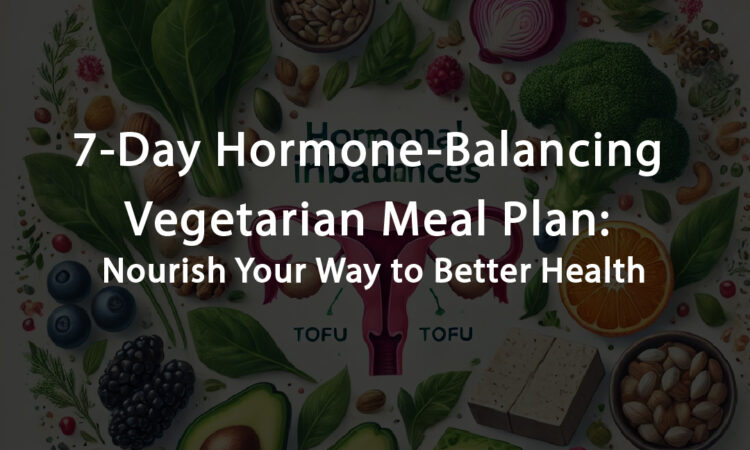Hormonal imbalances can have a profound effect on your overall health and well-being. From mood swings and fatigue to weight gain and skin issues, the symptoms of hormonal imbalances can be challenging to manage. While several factors contribute to hormonal health, diet plays a crucial role in regulating hormones and promoting balance. A well-planned vegetarian diet rich in nutrients can help you achieve and maintain hormonal harmony.
This article provides a comprehensive 7-day vegetarian diet plan designed to help balance your hormones naturally. We will also discuss the key principles of a hormone-balancing diet and provide tips for optimizing your meal plan to support overall health.
Understanding the Role of Diet in Hormonal Balance
Hormones are chemical messengers that regulate various bodily functions, including metabolism, growth, reproduction, and mood. When these hormones are out of balance, it can lead to a range of health issues. Diet plays a significant role in maintaining hormonal balance by providing the essential nutrients needed for hormone production and regulation.
Key dietary principles for balancing hormones include:
- Healthy Fats: Hormones are made from fat, so consuming healthy fats is crucial for hormone production. Focus on sources like avocados, nuts, seeds, and olive oil.
- Protein: Protein provides the building blocks for hormone synthesis. Include plant-based protein sources such as legumes, tofu, tempeh, and quinoa.
- Fiber: Fiber supports digestion and helps remove excess hormones from the body. Aim to include plenty of fruits, vegetables, and whole grains.
- Antioxidants: Antioxidants protect cells from oxidative stress and inflammation, which can disrupt hormone balance. Incorporate a variety of colorful fruits and vegetables rich in antioxidants.
- Whole Foods: Avoid processed foods and refined sugars, which can cause blood sugar spikes and disrupt hormonal balance. Focus on whole, unprocessed foods.
7-Day Vegetarian Diet Plan for Hormonal Balance
This 7-day diet plan is designed to provide a balanced intake of nutrients that support hormonal health. Each day includes breakfast, lunch, dinner, and snacks, along with tips for optimizing your meals.
Day 1
Breakfast: Avocado Toast with a Side of Berries
- Whole-grain toast topped with mashed avocado, a sprinkle of chia seeds, and a side of mixed berries.
- Tip: Avocado provides healthy fats that support hormone production, while berries are rich in antioxidants.
Lunch: Quinoa Salad with Roasted Vegetables
- Quinoa salad with roasted vegetables (such as sweet potatoes, bell peppers, and zucchini), chickpeas, and a lemon-tahini dressing.
- Tip: Quinoa is a complete protein, providing all the essential amino acids needed for hormone synthesis.
Dinner: Lentil and Spinach Soup
- A hearty soup made with green lentils, spinach, carrots, celery, and a dash of turmeric.
- Tip: Lentils are a great source of plant-based protein and fiber, while spinach is rich in magnesium, which helps regulate cortisol levels.
Snack: Almonds and Apple Slices
- A handful of almonds paired with apple slices.
- Tip: Almonds are rich in healthy fats and vitamin E, which supports hormonal health.
Day 2
Breakfast: Greek Yogurt with Flaxseeds and Blueberries
- Greek yogurt topped with ground flaxseeds, fresh blueberries, and a drizzle of honey.
- Tip: Flaxseeds are rich in lignans, which can help balance estrogen levels.
Lunch: Chickpea and Spinach Wrap
- A whole-grain wrap filled with chickpeas, spinach, avocado, and a sprinkle of feta cheese.
- Tip: Chickpeas are high in fiber and protein, making them ideal for maintaining stable blood sugar levels.
Dinner: Stir-Fried Tofu with Broccoli and Brown Rice
- Stir-fried tofu with broccoli, bell peppers, and brown rice, seasoned with ginger and garlic.
- Tip: Tofu is a great source of plant-based protein and contains phytoestrogens that may help balance hormones.
Snack: Carrot Sticks with Hummus
- Fresh carrot sticks dipped in hummus.
- Tip: Carrots are high in beta-carotene, which is converted into vitamin A, supporting thyroid health.
Day 3
Breakfast: Green Smoothie with Spinach and Banana
- A smoothie made with spinach, banana, almond milk, and a scoop of plant-based protein powder.
- Tip: Spinach is high in magnesium, which helps reduce stress and cortisol levels.
Lunch: Lentil and Kale Salad with a Lemon Dressing
- A salad made with cooked lentils, chopped kale, cherry tomatoes, and a lemon dressing.
- Tip: Kale is rich in antioxidants and fiber, supporting detoxification and hormone balance.
Dinner: Sweet Potato and Black Bean Tacos
- Whole-grain tortillas filled with roasted sweet potatoes, black beans, avocado, and salsa.
- Tip: Sweet potatoes are high in fiber and vitamin A, supporting reproductive health.
Snack: Walnuts and Dark Chocolate
- A small handful of walnuts with a piece of dark chocolate.
- Tip: Walnuts are rich in omega-3 fatty acids, which support hormone production, and dark chocolate is a good source of magnesium.
Day 4
Breakfast: Chia Pudding with Mixed Berries
- Chia seeds soaked in almond milk overnight, topped with mixed berries and a sprinkle of coconut flakes.
- Tip: Chia seeds are rich in omega-3 fatty acids and fiber, both of which support hormonal health.
Lunch: Grilled Vegetable and Quinoa Bowl
- A bowl of quinoa topped with grilled vegetables (such as zucchini, eggplant, and bell peppers) and a drizzle of olive oil.
- Tip: Olive oil provides healthy fats that support hormone production.
Dinner: Red Lentil Curry with Brown Rice
- A warming red lentil curry made with coconut milk, tomatoes, spinach, and spices, served over brown rice.
- Tip: Lentils and spinach provide plant-based protein and iron, which are essential for hormone synthesis.
Snack: Celery Sticks with Almond Butter
- Celery sticks dipped in almond butter.
- Tip: Almond butter is rich in healthy fats and vitamin E, supporting skin and hormonal health.
Day 5
Breakfast: Oatmeal with Almonds and Berries
- Cooked oats topped with sliced almonds, fresh berries, and a drizzle of maple syrup.
- Tip: Oats are high in fiber, supporting digestion and the elimination of excess hormones.
Lunch: Mediterranean Chickpea Salad
- A salad made with chickpeas, cucumbers, tomatoes, olives, feta cheese, and a balsamic vinaigrette.
- Tip: Chickpeas provide plant-based protein, while olives and feta cheese offer healthy fats.
Dinner: Spaghetti Squash with Tomato and Basil
- Roasted spaghetti squash topped with a homemade tomato sauce, fresh basil, and a sprinkle of parmesan cheese.
- Tip: Spaghetti squash is low in carbohydrates and high in fiber, supporting stable blood sugar levels.
Snack: Pumpkin Seeds and Dried Apricots
- A handful of pumpkin seeds with a few dried apricots.
- Tip: Pumpkin seeds are rich in zinc, which is essential for hormone production.
Day 6
Breakfast: Smoothie Bowl with Banana and Nut Butter
- A smoothie bowl made with banana, almond milk, spinach, and a scoop of protein powder, topped with granola and a drizzle of nut butter.
- Tip: Bananas provide potassium, which supports adrenal health, while nut butter offers healthy fats.
Lunch: Tofu and Vegetable Stir-Fry
- Stir-fried tofu with a mix of vegetables (such as bok choy, carrots, and snap peas) served over quinoa.
- Tip: Tofu provides plant-based protein and phytoestrogens, supporting hormone balance.
Dinner: Stuffed Bell Peppers with Quinoa and Black Beans
- Bell peppers stuffed with a mixture of quinoa, black beans, corn, and spices, baked until tender.
- Tip: Black beans are high in fiber and protein, supporting stable blood sugar levels.
Snack: Mixed Nuts and Dried Cranberries
- A handful of mixed nuts with dried cranberries.
- Tip: Nuts provide healthy fats and antioxidants, supporting overall hormonal health.
Day 7
Breakfast: Scrambled Tofu with Spinach and Mushrooms
- Scrambled tofu with spinach, mushrooms, and a sprinkle of nutritional yeast.
- Tip: Tofu is a great source of plant-based protein, and spinach is rich in magnesium, supporting hormonal balance.
Lunch: Roasted Vegetable and Lentil Salad
- A salad made with roasted vegetables (such as sweet potatoes, beets, and Brussels sprouts), lentils, and a balsamic glaze.
- Tip: Lentils and sweet potatoes provide protein and fiber, supporting digestion and hormone health.
Dinner: Zucchini Noodles with Pesto and Cherry Tomatoes
- Zucchini noodles topped with homemade pesto, cherry tomatoes, and pine nuts.
- Tip: Zucchini is low in calories and high in water content, supporting hydration and weight management.
Snack: Cucumber Slices with Hummus
- Fresh cucumber slices dipped in hummus.
- Tip: Cucumbers are hydrating and low in calories, while hummus provides protein and fiber.
Tips for Optimizing Your Hormone-Balancing Diet
- Eat Regularly: Skipping meals can cause blood sugar fluctuations, which can disrupt hormone balance. Aim to eat balanced meals and snacks every 3-4 hours.
- Include Healthy Fats: Healthy fats are essential for hormone production. Include sources like avocados, nuts, seeds, and olive oil in your diet.
- Stay Hydrated: Proper hydration is crucial for overall health and hormone regulation. Drink plenty of water throughout the day, and include hydrating foods like cucumbers and watermelon.
- Focus on Fiber: Fiber supports digestion and the elimination of excess hormones. Include a variety of fiber-rich foods like vegetables, fruits, whole grains, and legumes.
- Limit Processed Foods and Sugars: Processed foods and refined sugars can cause blood sugar spikes and contribute to hormonal imbalances. Focus on whole, unprocessed foods.
- Incorporate Antioxidants: Antioxidants protect cells from oxidative stress and inflammation, which can disrupt hormonal balance. Include a variety of colorful fruits and vegetables rich in antioxidants.
- Consider Supplements: If you’re struggling to meet your nutrient needs through diet alone, consider taking supplements to support hormonal health. Common supplements for hormone balance include omega-3 fatty acids, magnesium, vitamin D, and probiotics. Always consult with a healthcare provider before starting any new supplements.
Achieving hormonal balance requires a holistic approach that includes a well-planned diet, regular physical activity, stress management, and adequate sleep. This 7-day vegetarian diet plan provides a variety of nutrient-dense meals that support hormonal health by providing essential vitamins, minerals, healthy fats, and antioxidants.
Remember that consistency is key when it comes to diet and hormone balance. Incorporate these principles into your daily routine and listen to your body’s needs. Over time, you may notice improvements in your energy levels, mood, skin health, and overall well-being.
If you suspect that you have a hormonal imbalance, it’s important to consult with a healthcare provider for proper diagnosis and treatment. While diet can play a significant role in supporting hormonal health, it’s important to address any underlying medical conditions with the guidance of a healthcare professional.
By focusing on nourishing your body with the right foods and making lifestyle changes that support hormonal balance, you can take control of your health and achieve a state of harmony and well-being.




